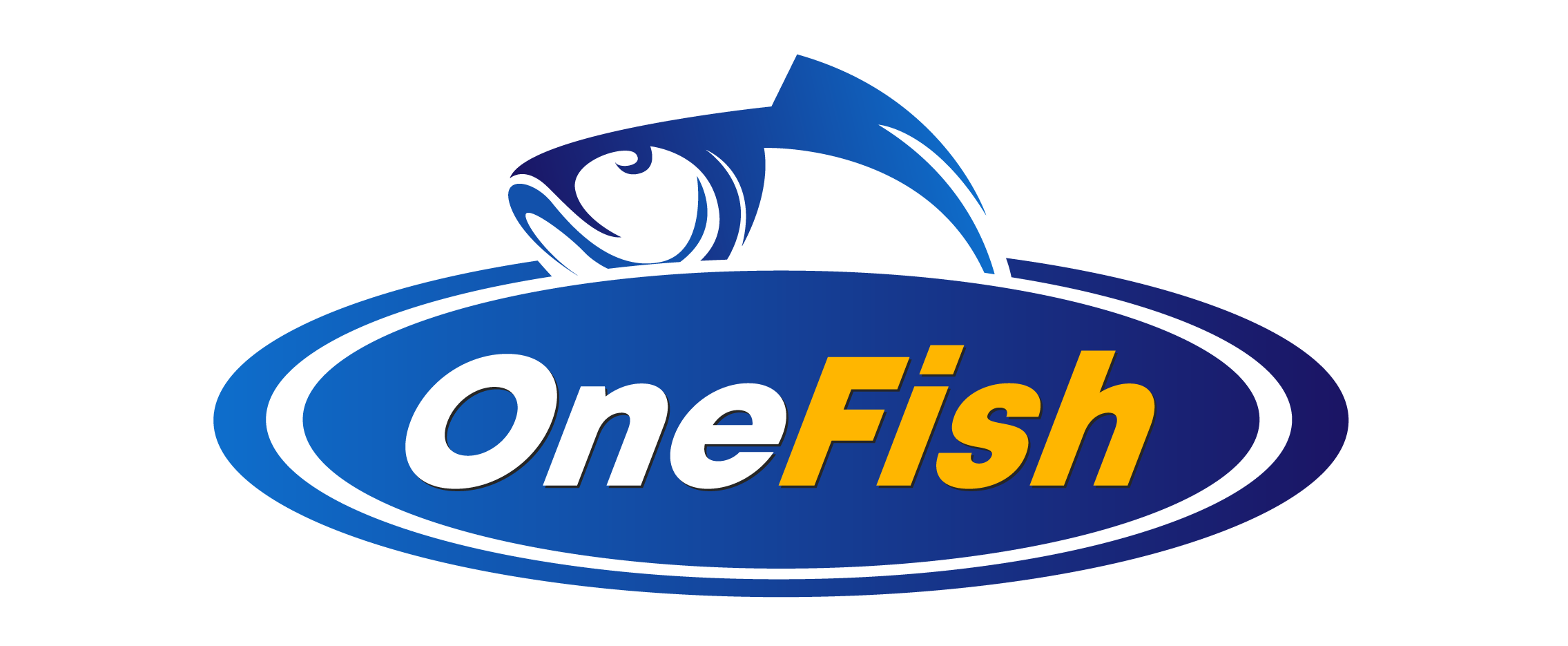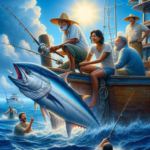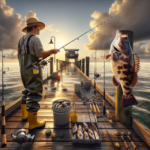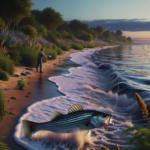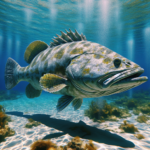Shore Fishing in Oregon’s Coastal Rivers
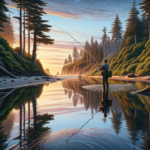
Introduction
Did you know that Oregon’s coastal rivers are home to some of the most diverse and abundant fish populations in the United States? Whether you’re a seasoned angler or a novice looking to cast your first line, shore fishing in these rivers offers a unique and rewarding experience. This article will guide you through the essentials of shore fishing in Oregon’s coastal rivers, covering everything from the best fishing techniques and species information to top fishing spots and seasonal considerations.
Understanding the intricacies of shore fishing in Oregon’s coastal rivers can significantly enhance your fishing experience. Whether you’re aiming to catch the elusive Chinook salmon or simply enjoy a peaceful day by the water, this guide will provide you with the knowledge and tools you need to succeed.
Background/Context
Historical or Cultural Significance
Fishing has been an integral part of Oregon’s culture and history for centuries. Indigenous tribes relied on the abundant fish populations in the coastal rivers for sustenance and trade. Today, fishing remains a popular recreational activity, drawing thousands of anglers to the state’s rivers each year.
Geographical Overview
Oregon’s coastal rivers, including the Rogue, Umpqua, and Siuslaw, flow from the Cascade Range to the Pacific Ocean. These rivers are characterized by their diverse ecosystems, which include lush forests, rocky banks, and estuarine environments. The climate in this region is generally mild, with wet winters and dry summers, creating ideal conditions for various fish species.
Key Points/Details
Fishing Techniques
Technique Overview
Shore fishing in Oregon’s coastal rivers can be approached using several techniques, including fly fishing, spin casting, and bait fishing. Each technique has its own set of advantages and is suited to different conditions and target species.
When and Where to Use
Fly fishing is particularly effective in shallow, fast-moving waters where fish are likely to be feeding on insects. Spin casting is versatile and can be used in a variety of conditions, making it a popular choice for many anglers. Bait fishing is ideal for deeper waters and can be highly effective for catching larger species like salmon and steelhead.
Recommended Gear
- Fly Fishing: 9-foot rod, 5-7 weight line, floating or sinking fly line, and a variety of flies.
- Spin Casting: Medium-action rod, spinning reel, 8-12 lb test line, and a selection of lures and spinners.
- Bait Fishing: Heavy-action rod, baitcasting reel, 15-20 lb test line, and natural baits like worms, shrimp, or roe.
Species Information
Species Overview
Oregon’s coastal rivers are home to a variety of fish species, including Chinook salmon, Coho salmon, steelhead, and cutthroat trout. Each species has its own unique habits and preferred habitats, making them exciting targets for anglers.
Best Practices
To successfully catch these species, it’s important to understand their seasonal behaviors. For example, Chinook salmon are typically found in the rivers from late spring to early fall, while steelhead can be caught year-round. Using the right gear and techniques, such as drift fishing for salmon or nymphing for trout, can greatly increase your chances of success.
Location Information
Top Fishing Spots
- Rogue River: Known for its abundant salmon and steelhead populations, with access points at Gold Beach and Agness.
- Umpqua River: Offers excellent fishing for Chinook salmon and smallmouth bass, with popular spots near Reedsport and Scottsburg.
- Siuslaw River: A prime location for Coho salmon and cutthroat trout, with access points at Florence and Mapleton.
Regulations and Licenses
Anglers must adhere to local fishing regulations, which include obtaining a valid Oregon fishing license and any necessary tags for specific species. It’s also important to be aware of catch limits and seasonal restrictions to ensure sustainable fishing practices.
Seasonal Considerations
Seasonal Variations
Fishing conditions in Oregon’s coastal rivers can vary significantly throughout the year. During the winter months, high water levels and strong currents can make fishing challenging, while the summer offers more stable conditions and increased fish activity.
Best Times to Fish
The optimal times for fishing in these rivers are typically early morning and late evening, when fish are most active. Seasonal peaks, such as the fall salmon run, also provide excellent opportunities for anglers.
Events and Tournaments
Event Overview
Oregon hosts several fishing events and tournaments throughout the year, including the annual Rogue River Salmon Derby and the Umpqua River Steelhead Tournament. These events offer a chance for anglers to compete and showcase their skills.
Preparation Tips
To prepare for these events, it’s important to practice your techniques, ensure your gear is in top condition, and familiarize yourself with the specific rules and regulations of the tournament.
Tips and Best Practices
General Tips
- Always check the weather forecast before heading out to ensure safe and comfortable fishing conditions.
- Be patient and persistent; fishing can require long periods of waiting and observation.
- Respect other anglers and maintain a reasonable distance to avoid crowding.
Avoid Common Mistakes
- Using the wrong gear for the target species can significantly reduce your chances of success.
- Ignoring local regulations can result in fines and negatively impact fish populations.
- Failing to properly handle and release fish can cause unnecessary harm to the species.
Advanced Techniques
- Mastering the art of reading the water can help you identify the best fishing spots and increase your catch rate.
- Experimenting with different fly patterns and lures can help you find what works best for the conditions.
- Using a fish finder or other technology can provide valuable insights into fish behavior and location.
Gear and Equipment Recommendations
Essential Gear
- Rod and reel suited to your chosen fishing technique.
- Appropriate line and leader for the target species.
- A variety of lures, flies, or baits.
- Fishing vest or tackle box to organize your gear.
- Polarized sunglasses to reduce glare and improve visibility.
Optional Gear/Upgrades
- Waders for accessing deeper waters and staying dry.
- Fish finder or GPS device for locating fish and navigating the river.
- High-quality cooler for storing your catch.
Where to Buy or Rent
Local shops like Fisherman’s Marine & Outdoor and online retailers such as Bass Pro Shops offer a wide range of fishing gear. Some locations also provide rental options for those who prefer not to invest in their own equipment.
Safety and Conservation
Safety Tips
- Always wear a life jacket when fishing near deep or fast-moving water.
- Be aware of your surroundings and watch for wildlife hazards, such as bears or snakes.
- Carry a first aid kit and know basic first aid procedures.
Conservation Practices
- Practice catch and release to help maintain healthy fish populations.
- Respect local wildlife and avoid disturbing their habitats.
- Follow all fishing regulations and report any violations to authorities.
Planning Your Trip
Accommodations
There are numerous lodging options near Oregon’s coastal rivers, ranging from campgrounds and RV parks to hotels and vacation rentals. Popular choices include the Gold Beach Inn near the Rogue River and the Best Western Salbasgeon Inn & Suites near the Umpqua River.
Travel Tips
When planning your trip, consider the best routes to your chosen fishing spots and any transportation needs. Many areas are accessible by car, but some remote locations may require a boat or hiking.
Additional Activities
In addition to fishing, the Oregon coast offers a variety of other activities, such as hiking, bird watching, and exploring local towns and attractions. This makes it an ideal destination for families or groups with diverse interests.
Frequently Asked Questions (FAQs)
Do I need a fishing license to fish in Oregon’s coastal rivers?
Yes, a valid Oregon fishing license is required for all anglers aged 12 and older. Additional tags may be needed for certain species.
What is the best time of year to fish in Oregon’s coastal rivers?
The best time to fish varies by species, but generally, late spring to early fall offers the most favorable conditions.
Can I fish from a boat in these rivers?
Yes, boat fishing is allowed in many areas, but shore fishing offers a unique and accessible experience for anglers of all skill levels.
Conclusion
Shore fishing in Oregon’s coastal rivers provides an unparalleled opportunity to connect with nature and enjoy the thrill of the catch. By understanding the best techniques, species behaviors, and top fishing spots, you can enhance your fishing experience and make the most of your time on the water. Whether you’re a local angler or visiting from afar, Oregon’s coastal rivers offer something for everyone. So grab your gear, head to the river, and start making memories that will last a lifetime.
